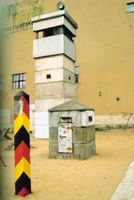The Berlin Wall Fell 22 Years Ago This Week
Written by Joel Meeker
 For 28 years the Berlin Wall and the iron curtain divided Germany. In the 22 years since, Germany has reemerged as the dominant power in Europe. Where will it lead?
For 28 years the Berlin Wall and the iron curtain divided Germany. In the 22 years since, Germany has reemerged as the dominant power in Europe. Where will it lead?
This year marks the 50th anniversary of the building of the Berlin Wall. This week marks the 22nd anniversary of its dismantling, which began Nov. 9, 1989. The world was glued to TV sets as Germans began climbing up and dancing on the wall that had been a symbol of domination, danger and death for my whole lifetime.
Last month my father and I visited Berlin for the first time. It is a fascinating and beautiful city with a grimly tortured past. It was from Berlin that Adolf Hitler ordered the conquest of Europe and the world. The city was bombed to rubble within a few years. Victorious Soviet soldiers were photographed raising the hammer and sickle over the shell of the smoldering Reichstag building in 1945.
My father and I discussed all this over lunch in a rooftop restaurant just yards from where those famous photos were taken. How things have changed.
The rise and fall of the Berlin Wall
For 15 years after the war Communist governments increasingly prevented Eastern Europeans from moving to the West. Berlin was the last loophole, the corridor to freedom, in Germany. To stem the flow, the East German government began building the Berlin Wall. East Berliners were cut off from West Berlin, which became an enclave surrounded by hostile troops.
Most of the wall is gone now. There are only a few sections that have been left in place, like the one near the museum built on the site of the destroyed Gestapo headquarters. In other places a line of bricks in the pavement traces the line it followed.
The German problem
Historians sometimes speak of “the German problem”—the disruptive influence of this large, vigorous people on its neighbors on all sides. This problem was noted as far back as the Roman Empire, and twice in the 20th century it led to world war. (World War I—the war to end all wars—ended 93 years ago today.)
Prominent Western leaders, such as former British Prime Minister Margaret Thatcher, feared a reunited Germany even more than the overtly hostile Soviet Union, and she even encouraged Mikhail Gorbachev not to let reunification occur.
The division of Germany, symbolized by the Berlin Wall, was viewed by some as a temporary solution to the German problem. But that stopgap ended 22 years ago, and German influence has been rising ever since.
The “problem” has not disappeared. As The Economist put it, “The German question never dies. Instead, like a flu virus, it mutates.” The problem currently is not military but financial. The industrious German nation increasingly dominates the economy of Europe. Tempers are fraying in Europe, where less industrious nations require bailouts from Germany, which is understandably loath to provide them.
All parties agree that the key to Europe’s future, and especially the future of the European Union, will be dependent on German participation and leadership.
What does the future hold for Europe?
Key Bible prophecies show that just before what is referred to by Jesus Christ as “the end of the age,” a time of great tribulation (trouble and suffering) will stun the world (Matthew 24:3, 14, 21-22). Among other things, this trouble will be caused by a world war, greater than any other. Revelation 9:18 indicates that at least a third of the population of the entire world will be killed.
Daniel 11:40-45 shows that early stages of that war will break out between forces led from Europe and others from Africa and the Middle East (to the north and south of the Holy Land).
And Daniel 2:40-45 shows that this European power will be a resurrection of the fourth great world-ruling empire, the Roman Empire. That end-time coalition of nations (see Revelation 17:12-14) will be centered on the same continent where Rome flourished.
It is difficult to imagine how this great end-time union could form without German leadership. It is increasingly likely that this nation will be in the driver’s seat in this powerful future European Union. The fall of the Berlin Wall and the reunification of Germany and Europe set the stage for the rise not only of individual nations, but the super-Union to come.
Crisis and revolutionary change
It is in times of crisis, such as the growing economic debacle in Europe, that revolutionary changes come about and revolutionary people come to the fore. They are almost always unexpected. French geopoliticist Laurent Artur du Plessis noted: “The alchemy of history suddenly reveals exceptional people during exceptional events” (as translated from La Troisième Guerre mondiale a commence [The Third World War Has Begun], 2002, p. 235).
The most exceptional events the world will ever know are yet ahead. We should watch the precursors closely, thankful in the knowledge that the conclusion of them all will be the establishment of the Kingdom of God on the earth.
Joel Meeker is the French-language regional director for the Church of God, a Worldwide Association.
See these related posts:








